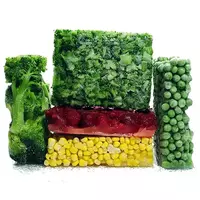Frozen vegetables

We think it's no secret that fresh vegetables are an excellent source of most of the vitamins necessary for the human body, as well as minerals and other compounds of natural origin. Some vegetables are called unique, since they contain a record amount of a useful compound. For example, carrots, tomatoes or beets. All this is wonderful, of course, but the main problem of vegetables is that when fresh, these incredibly healthy products are available only in the warm season.
Composition of frozen vegetables
In winter, some vegetables become hard-to-reach and expensive foods. However, people have long learned to harvest useful food products for future use in various ways. Freezing is considered one of the simplest, but at the same time effective ways to preserve the beneficial properties of frozen vegetables.
In addition, it is during freezing that the chemical composition of frozen vegetables undergoes the smallest changes. The thing is that during preservation or drying, the initial natural material is affected by high temperatures, which literally kills most of the useful compounds included in the vitamin-mineral composition of vegetables.
On the contrary, in most cases, the composition of frozen vegetables differs slightly from the characteristics of fresh foods. It is also noteworthy that the calorie content of frozen vegetables is constantly low. This is due to the fact that many types of fresh vegetables themselves differ in their dietary and low-calorie composition.
As a result of freezing, the calorie level of frozen vegetables does not undergo significant changes. According to the definition used in the food industry, frozen vegetables are a culinary semi-finished product or a product of high biological value.
Benefits of frozen vegetables
For the vast majority of frozen vegetables, fast freezing technology is used. With this treatment, all types of frozen vegetables retain in their chemical composition almost the initial amount of useful natural compounds. Currently, the food industry has a huge species variety of frozen vegetables, as well as vegetable mixtures.
The main issue that worries both consumers and doctors, as well as nutritionists to date remains the presence of the benefits or still harm of frozen vegetables. Supporters of frozen vegetables argue that the product benefits the human body. Because the fast-freeze method preserves most of the useful compounds in the product, the benefits of frozen vegetables are beyond question.
Harm to frozen vegetables
However, opponents of such a theory argue that the benefits of frozen vegetables are quite doubtful. In addition, manufacturers of frozen vegetables often use various food additives as part of the finished product. Opponents of such semi-finished products argue that the main harm of frozen vegetables to the human body lies in the use of dietary supplements.
Before industrial freezing, all vegetables undergo the so-called "shocking" treatment at a temperature in the 100S. As a result of this rapid processing, the original color of the vegetables changes. To restore the color or other consumer and taste parameters of frozen vegetables, manufacturers use food additives.
frozen vegetables 50 kCal
Energy value of frozen vegetables (Ratio of proteins, fats, carbohydrates - ju):
Proteins: 1.1 g (~ 4 kCal)
Fats: 0.2 g (~ 2 kCal)
Carbohydrates: 2.7 g (~ 11 kCal)
Energy ratio (bj | y): 9% | 4% | 22%
 Español
Español Français
Français Português
Português Русский
Русский 简体中文
简体中文 繁體中文
繁體中文 日本語
日本語 한국어
한국어 العربية
العربية Türkçe
Türkçe Қазақ
Қазақ Deutsch
Deutsch Italiano
Italiano Українська
Українська
